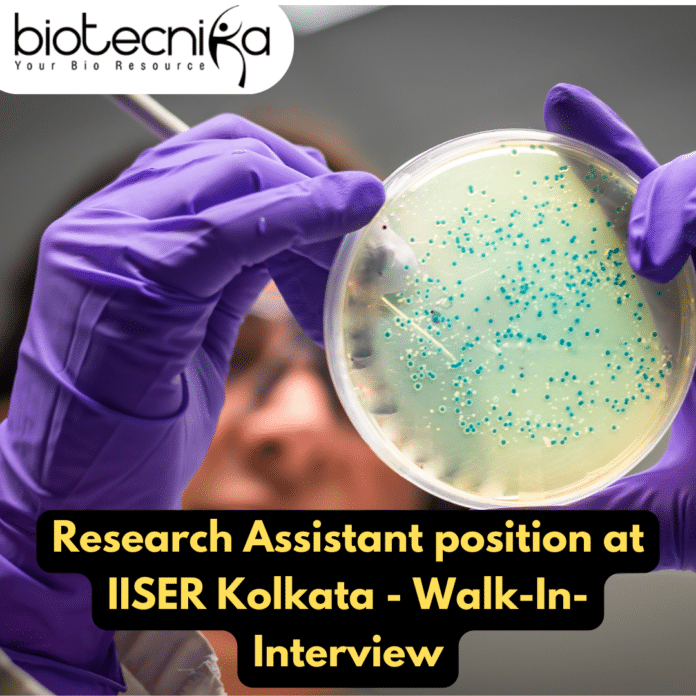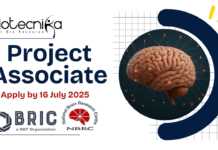Advertisement for the position of a Research Assistant opening as part of a project to be undertaken in the Centre for Climate and Environmental Studies at IISER Kolkata – Walk-in-Interview – Check out the details below
Project Title : Evaluation of a novel microbial consortia for effective management of fecal
coliform and biological oxygen demand (BOD) levels in septic tank
Funding Agency : West Bengal Pollution Control Board (WBPCB)
Temporary position : Research Assistant
Number of vacancy : 01
Salary : As per sanction letter (WBPCB)
Age Limit:
- Must not be over 35 years as on 14th September, 2023 which can be relaxed for certain reserved categories as per rules of Government of India.
- Relaxation in age, educational qualifications or experience may be considered in case of exceptionally meritorious candidates.
Background of the project : The project intends to evaluate the functional potential of novel microbial consortia for effective management of fecal coliform and biological oxygen
demand (BOD) levels in septic tank and sewage treatment plant (STP). For further details
please write to Prof. Punyasloke Bhadury at [email protected]
How to Apply:
Walk-in interview : 14th September, 2023.
Venue of interview : Meeting Room, IISER Kolkata Salt Lake, DC-35/1, Sector-I, Salt Lake, Kolkata-700064.
More details : The position is for a month to begin with and purely temporary in nature.
However, there is scope for extension based on the deliverables of project. No TA/DA will be paid for attending the interview.
Qualifications : Master’s degree in Natural Science including Microbiology/Environmental Science. Candidates with field experience including in aquatic environments will be preferred.
Click here for the notification
Explore Biotecnika for more Job Opportunities
Here are some potential interview questions and answers for the Research Assistant position at IISER Kolkata:
1. Can you provide an overview of your educational background and how it aligns with the requirements of this Research Assistant position?
Answer: I have a Master’s degree in Natural Science with a specialization in Microbiology. My academic background equips me with a strong foundation in the scientific principles and techniques necessary for this role, particularly in the area of microbiology and environmental science. I believe my education aligns well with the qualifications specified in the job advertisement.
2. Could you discuss any relevant field experience you have, especially in aquatic environments, and how it could benefit this research project?
Answer: During my academic journey, I actively sought opportunities for fieldwork, including in aquatic environments. I have conducted research projects related to water quality assessment and microbial ecology in various aquatic ecosystems. This experience has provided me with practical knowledge and skills that are directly applicable to evaluating microbial consortia for fecal coliform and BOD management in septic tanks and sewage treatment plants, which is the focus of this project.
3. Can you explain your understanding of the project’s objectives and how you plan to contribute to its success?
Answer: The primary objective of this project is to evaluate a novel microbial consortia’s effectiveness in managing fecal coliform and BOD levels in septic tanks and sewage treatment plants. To contribute to its success, I intend to apply my knowledge of microbiology and environmental science to conduct rigorous experiments and data analysis. I will work closely with the team to ensure that the research is conducted efficiently and that the project’s goals are met.
4. What interests you most about this research project, and how does it align with your career aspirations?
Answer: This research project is particularly appealing to me because it addresses a critical environmental issue – the management of fecal coliform and BOD levels. I am passionate about contributing to solutions that have a positive impact on the environment. This project aligns perfectly with my career aspirations, which involve conducting research that addresses real-world environmental challenges and finding sustainable solutions to them.
5. Are you aware of any specific techniques or methods commonly used in the evaluation of microbial consortia for water treatment purposes?
Answer: Yes, the evaluation of microbial consortia for water treatment often involves a combination of microbiological techniques, molecular biology methods, and water quality analysis. Common approaches include microbial culturing, DNA sequencing to identify microbial species, and assessing changes in water quality parameters such as fecal coliform levels and BOD. I am well-versed in these techniques and have applied them in my previous research projects.
ALL THE BEST!
Editor’s Note: Research Assistant position at IISER Kolkata – Interested and eligible candidates attend the Walk-in-Interview. Please ensure you are subscribed to the Biotecnika Times Newsletter and our YouTube channel to be notified of the latest industry news. Follow us on social media like Twitter, Telegram, Facebook and Instagram.









































